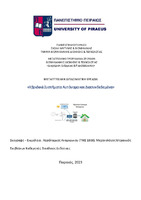Υβριδικά συστήματα αυτόνομα και διασυνδεδεμένα

View/
Keywords
Ενέργεια ; Βιωσιμότητα ; Υβριδικά ; Διασυνδεδεμένα ; Συστήματα ; Κύκλος ; Ανάλυση ; ΚόστοςAbstract
This research explores the field of self-contained and networked hybrid systems, primarily emphasizing its uses in relation to renewable energy and the circular economy. In the face of the world's serious issues with social development and environmental sustainability, hybrid organizations have become essential agents of change. We highlight the significance that hybrid systems play in promoting sustainable development as we examine the complex link that exists between them and the circular economy.
Hybrid organizations are a special combination of socially conscious businesses and profit-driven institutions. We look at how important they are for achieving sustainable development objectives, especially in light of the circular economy, which emphasizes waste minimization and resource efficiency. Is also covered the connection of hybrid organizations with social businesses, highlighting their dedication to tackling sustainability on both the social and environmental fronts.
We also explore the relationship between Laudato Si and the circular economy, highlighting the significance of these interrelated systems in tackling the complex issues brought on by resource depletion and climate change. Making the shift to sustainable energy is a crucial part of this project. We analyze the Greek electrical generating landscape, illuminating the effects of lignite use and carbon dioxide emissions on the environment. We also look at international initiatives to address these global issues, as well as the greenhouse effect and climate change.
We provide a thorough overview of the many kinds of renewable energy sources (RES) and their roles in mitigating climate change. RES are essential to establishing a sustainable energy future. In particular, hybrid systems provide creative ways to supply isolated or specialized loads and incorporate renewable energy sources into current networks. We explore a range of hybrid system applications, highlighting how they might help close the gap between traditional and sustainable energy production.
We do an extensive literature analysis of research and life cycle analyses, both internationally and in the Greek context, to support our investigation. These studies provide important new understandings of the economic and environmental effects of networked, autonomous hybrid systems. Furthermore, life cycle cost analysis is presented as a critical instrument for evaluating the financial sustainability of power plants, with an emphasis on solar array size. The research also presents a comprehensive view of self-governing and networked hybrid systems, highlighting their critical role in advancing sustainability, mitigating climate change, and boosting economic efficiency. It emphasizes how crucial it is to use creative thinking and multidisciplinary ways to tackle the difficult problems of the modern world.


